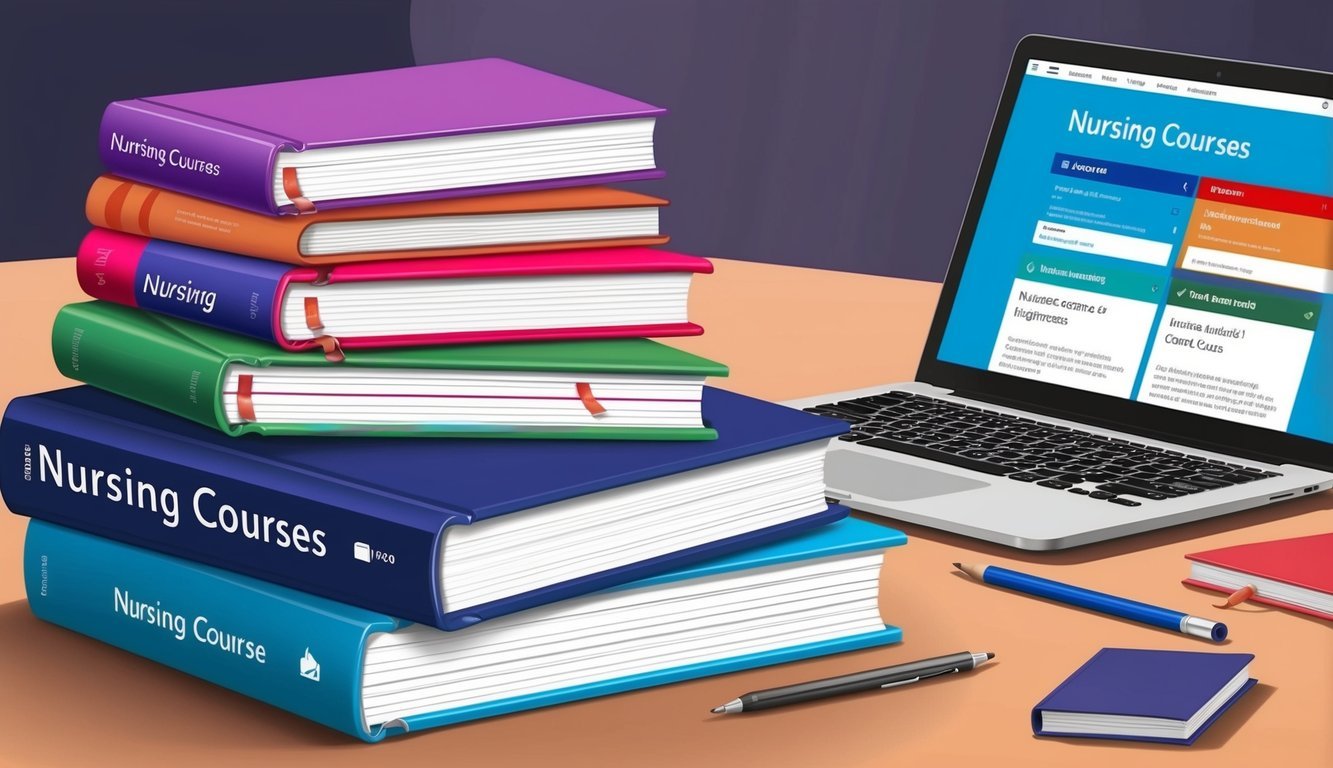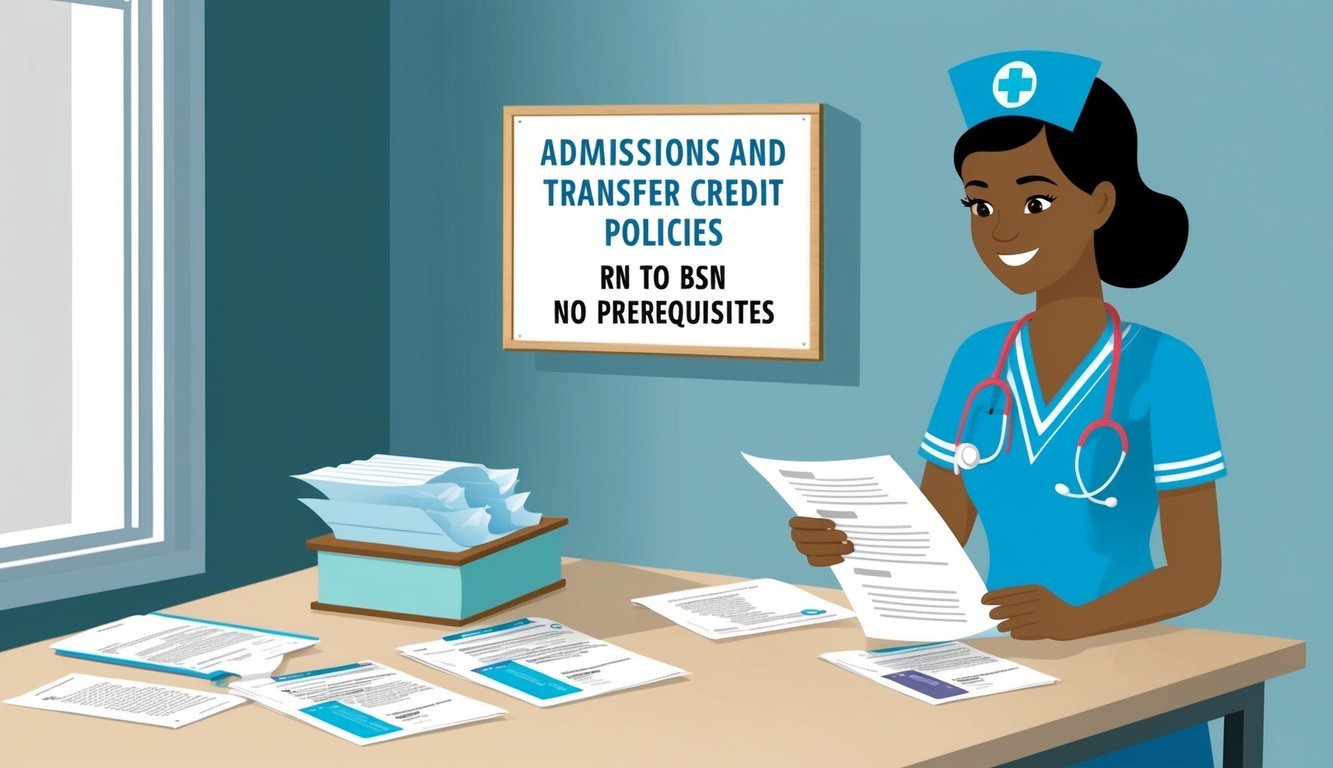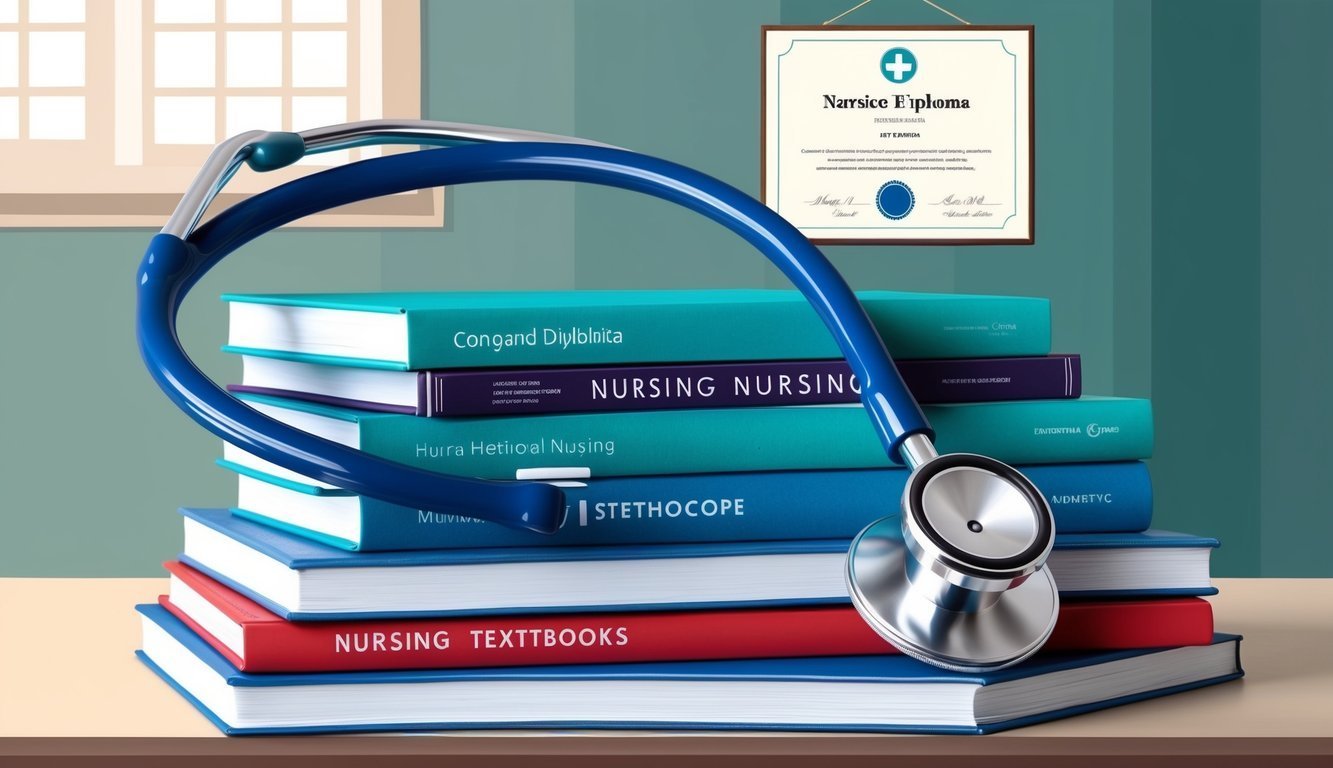Many registered nurses (RNs) look for ways to advance their careers, and enrolling in an RN to BSN program can be a great option. You can find online RN to BSN programs that do not require any prerequisites, allowing you to start your studies without additional coursework.
This flexibility makes it easier for busy professionals to complete their degrees and further their nursing careers.
Online RN to BSN programs offer a streamlined path to a Bachelor of Science in Nursing, focusing on essential nursing skills, leadership, and health care trends.
With no prerequisites, you can jump straight into your core classes and make significant progress in a short amount of time.
Many schools offer these programs with flexible schedules, enabling you to balance your education with work and personal commitments.
By choosing an RN to BSN program with no prerequisites, you position yourself for better job opportunities and potential salary increases.
As the health care field continues to evolve, having a BSN can open doors to leadership roles and specialized nursing positions.
Key Takeaways
- You can start an online RN to BSN program without needing any prior coursework.
- These programs often offer flexible schedules suited for working nurses.
- Earning a BSN can lead to better job prospects and higher earning potential.
Understanding RN to BSN Programs
RN to BSN programs provide a pathway for registered nurses to advance their education and career.
These initiatives often emphasize the importance of accreditation and offer options that do not require prerequisites, making them accessible for many.
The Importance of Accreditation
Accreditation ensures the quality and credibility of nursing programs.
It indicates that a program meets certain standards set by recognized bodies.
One of the key accrediting organizations for nursing programs is the Commission on Collegiate Nursing Education (CCNE).
When choosing an RN to BSN program, ensure it is accredited.
This not only enhances the value of your degree but can also affect eligibility for federal financial aid.
Many employers prefer graduates from accredited programs as they are seen as more competent and prepared.
Exploring No Prerequisite Options
Many RN to BSN programs, especially online options, cater to nurses without prior college coursework.
These programs typically allow you to start your degree without needing additional prerequisites.
For example, institutions like Indiana University offer programs specifically designed for working adults, enabling you to complete your degree in as little as 12 months by studying full-time.
This flexibility is beneficial for busy professionals seeking to balance work and education.
No clinical requirements also make these programs appealing because they focus on theoretical knowledge that can be applied in various settings.
These programs, aligned with the Bachelor of Science in Nursing (BSN) degree, equip you with valuable skills relevant to nursing practice.
They help you advance in your career and increase your earning potential while accommodating your existing commitments.
Curriculum and Coursework Details

In this section, you will find essential information about the course structure of RN to BSN programs.
These programs are designed to enhance your nursing skills through a mix of core nursing classes and liberal arts education.
Core Nursing Classes and Specializations
In core nursing classes, you will study topics fundamental to nursing practice.
These include Health Assessment, where you learn to evaluate patient health, and Nursing Theory, which provides the frameworks for nursing practice.
You will also engage in Healthcare Policy, understanding the regulations that impact patient care.
Courses often include Nursing Research, focusing on evidence-based practice to improve patient outcomes. Community Health Nursing teaches you to work with diverse populations and manage health programs.
While many programs do not require clinical hours, they can offer opportunities to apply your knowledge in real-world settings.
Liberal Arts and General Education
Liberal arts courses are vital for rounding out your nursing education.
These classes improve your critical thinking and communication skills, crucial for effective patient care.
You may take courses in psychology, sociology, and ethics, allowing a better understanding of patient needs and societal factors affecting health.
General education requirements often include studies in humanities and social sciences.
This well-rounded approach ensures you can address the holistic needs of patients and families.
Some programs may even offer courses in professional development, preparing you for future career advancement.
Consider exploring programs like those listed on Nurse.org for specific details on coursework and offerings.
Admissions and Transfer Credit Policies

Understanding admissions criteria and transfer credit policies is crucial for a smooth transition into an RN to BSN program.
These policies outline how your previous education can impact your journey toward earning a Bachelor’s degree.
Evaluating Transfer Credits
When assessing transfer credits, schools typically review your previous coursework to determine eligibility.
Most institutions accept credits from accredited programs, which may include Nursing Diplomas or Associate Degree Nursing (ADN) programs.
Factors for Evaluating Transfer Credits:
- Accreditation: Credits from accredited institutions are usually accepted.
- Content Relevance: Courses must closely match the nursing curriculum.
- Grade Requirements: Some programs require a minimum grade, often a “C” or better.
Know that policies differ by institution.
Be sure to check with your target school’s transfer credit policy, as some may limit the number of credits accepted.
More details can be found in specific program guides, such as those from Chamberlain University.
Advanced Standing for ADN or Diploma Holders
If you hold an ADN or a nursing diploma, you may qualify for advanced standing, allowing you to bypass certain foundational courses.
This can significantly shorten the time required to complete your BSN.
Key Benefits for ADN or Diploma Holders:
- Proficiency Credits: Many programs grant credits for prior learning, like clinical practice.
- Streamlined Pathway: You may only need to complete core nursing and general education courses.
For instance, some schools may award up to 77 proficiency credits for your existing nursing education.
Be sure to inquire about these credits when you apply, as they can greatly affect your total credit requirements and program duration.
More information can often be found through resources like Stanbridge University.
Program Advantages and Career Outcomes

Pursuing an RN to BSN program without prerequisites offers significant benefits for your nursing career.
You can enhance your skills and prepare for advanced roles, which can lead to higher earning potential and better patient care outcomes.
Enhancing Career Prospects and Earning Potential
An RN to BSN program can improve your job prospects and increase your earning potential.
In many healthcare settings, having a BSN is becoming a requirement for various nursing roles.
Your skills in critical thinking, leadership, and communication will be refined during your studies, making you more marketable to employers.
Earning Potential can vary by location and specialization, but it is common for BSN-prepared nurses to earn $10,000 to $20,000 more annually than those with an RN diploma.
| Position | Average Salary |
|---|---|
| RN (with Diploma) | $60,000 – $70,000 |
| RN (with BSN) | $70,000 – $90,000 |
With a BSN, you also gain access to roles in community health and leadership, further enhancing your career trajectory.
Transitioning to Advanced Nursing Roles
Earning your BSN opens doors to advanced nursing positions.
As healthcare becomes more complex, the demand for nurses with advanced knowledge and skills continues to grow.
In a BSN program, you will delve into topics such as community health nursing, patient care strategies, and evidence-based practices.
These topics are crucial for roles that focus on leadership and improved patient outcomes.
You will also develop key leadership skills that are valuable for supervisory positions in hospitals and clinics.
These roles often focus on managing teams, improving patient care processes, and fostering a culture of safety.
With a BSN, you are better positioned to pursue specialties, such as nurse educator or clinical nurse leader, elevating your career even further.
Logistics and Financial Considerations

When you consider an RN to BSN program with no prerequisites, logistics and finances play a crucial role.
You should understand the program formats, lengths, and tuition costs.
This will help you make a well-informed decision.
Comparing Program Lengths and Formats
RN to BSN programs vary in length and format.
Many online classes allow you to study from anywhere, making it flexible for your schedule.
Programs may take as little as 12 months to complete for full-time students or 18-24 months for part-time attendees.
You can choose between programs with or without clinical requirements.
Programs without clinicals often focus solely on theoretical knowledge.
This difference can impact how quickly you can finish your degree.
Here is a simple comparison:
| Program Type | Length | Clinical Requirement |
|---|---|---|
| Accelerated Online | 12 months | No |
| Traditional On-Campus | 18-24 months | Yes |
| Online with No Clinicals | 12-18 months | No |
Understanding Tuition and Opportunities to Save
Tuition for RN to BSN programs can range significantly.
You may find costs from $10,000 to $60,000, depending on the institution and program type.
Public universities often offer lower tuition rates compared to private colleges.
You can save money through various options, such as scholarships, grants, or employer tuition reimbursement.
Some programs may offer additional savings if you enroll as an online student, reducing commuting and housing expenses.
Consider looking into financial aid options and asking your employer about support for education.
This can help manage costs and make your investment in education more affordable.
Frequently Asked Questions

You may have many questions about RN to BSN programs that don’t require prerequisites.
This section addresses common inquiries about top-rated options, differences from traditional programs, clinical hour requirements, state offerings, program duration, and transitioning paths.
What are the top-rated RN to BSN programs with no prerequisites?
Several programs stand out for their quality and accessibility.
Some of the top-rated options include:
| Program Name | University | Duration |
|---|---|---|
| RN to BSN Online | Florida Atlantic University | 12-24 months |
| RN to BSN Program | Georgia Southwestern State University | 12-18 months |
| Online RN to BSN | California State University, Fullerton | 15-24 months |
These programs are designed specifically for registered nurses looking to advance their education quickly.
How do RN to BSN programs without prerequisites differ from traditional programs?
RN to BSN programs without prerequisites typically allow you to start right away without additional courses.
Traditional programs may require foundational courses that can extend your timeline.
You can focus on advanced nursing topics, making the learning process more direct.
Are there any RN to BSN online programs that do not require clinical hours?
Yes, some online RN to BSN programs do not mandate clinical hours.
They focus on theoretical knowledge and often include project-based assignments.
These programs are popular for those balancing work or personal commitments.
You can explore options at universities that offer this flexibility like those listed at Nursing Process.
Which states offer the best options for RN to BSN programs without prerequisites?
States such as Texas, Florida, and California have a range of RN to BSN programs without prerequisites.
They prioritize nursing education and provide various online and on-campus options.
Research schools in these states to find programs that fit your needs.
Is it possible to complete an RN to BSN program in 6 months without prerequisites?
Completing an RN to BSN program in as little as 6 months is ambitious but possible if you enroll in an accelerated program.
Some institutions offer fast-track options for dedicated students.
Check program specifics at universities that advertise accelerated timelines.
How can I transition from an RN to a BSN without having an ADN?
If you do not have an Associate Degree in Nursing (ADN), you can still pursue a BSN.
Programs are available for students with other credentials, such as a diploma in nursing.
They may include foundational courses to prepare you for a BSN program.
Look for universities that specifically accommodate these pathways, as highlighted by sources like Forbes.

